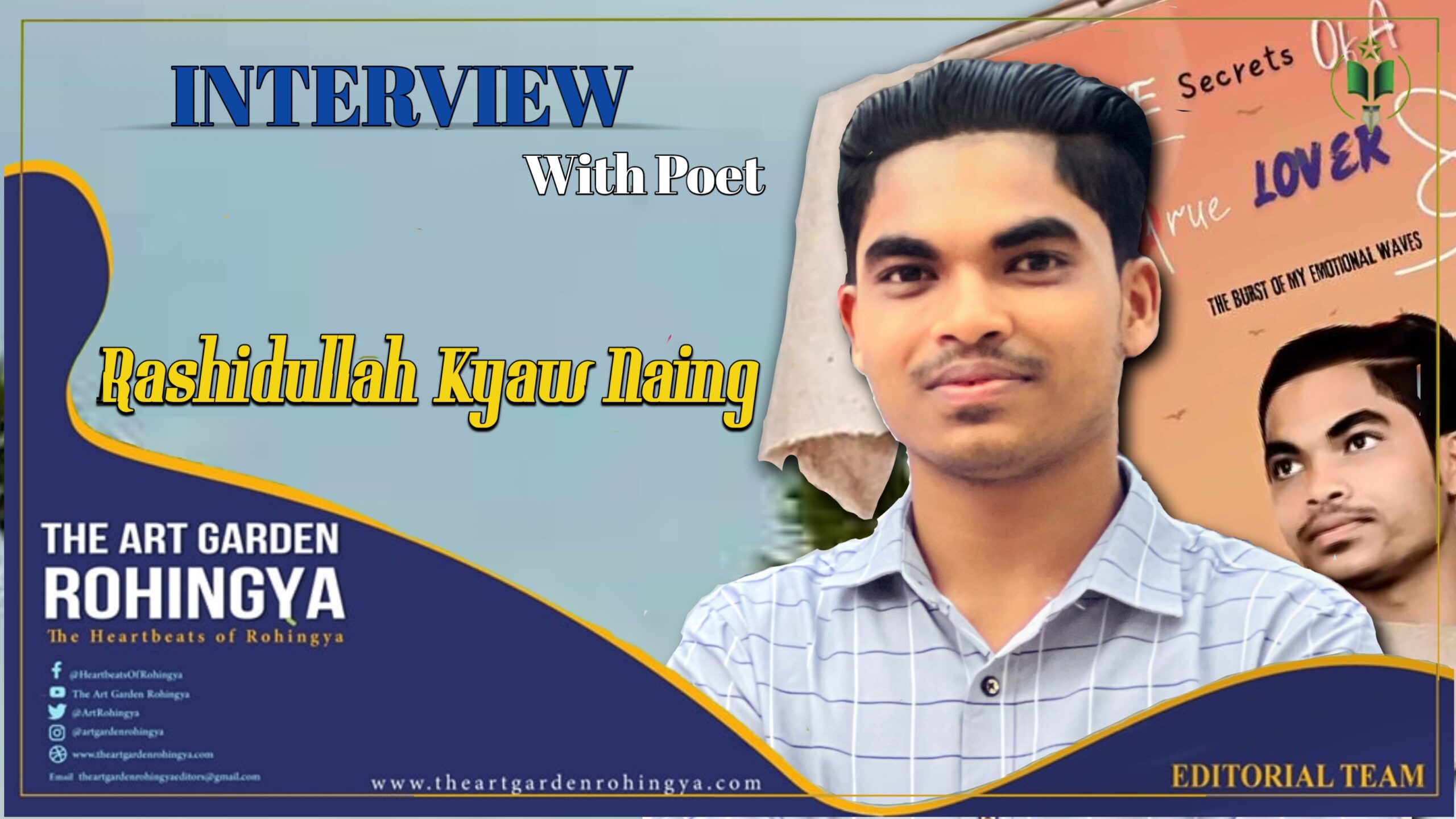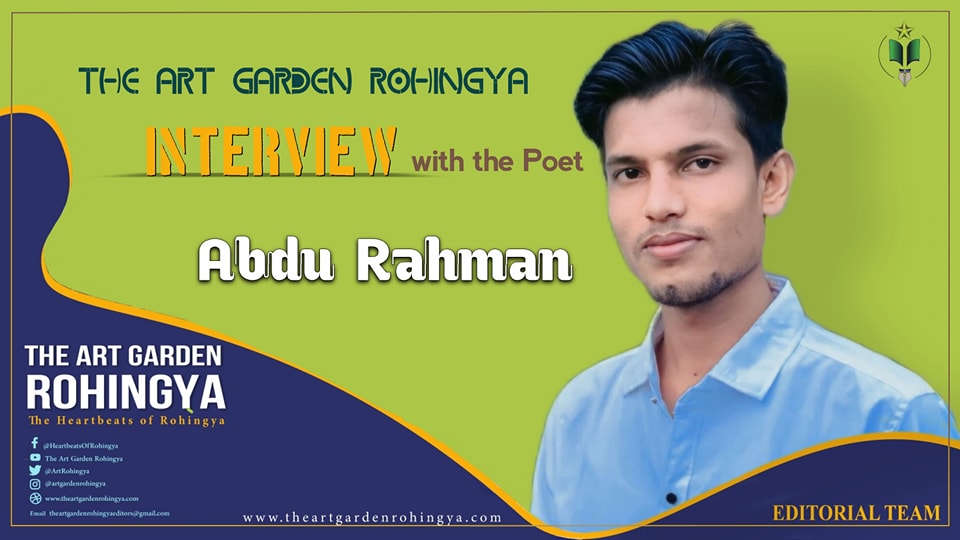The Art Garden Rohingya Interview with the poet and artist Mayyu Khan
January 29, 2021
The Art Garden Rohingya is the first Rohingya community poetry and art platform. We publish poetry and other forms of artworks in print, online website and social media and hence, encouraging Rohingya writers and artists as well as promoting our Rohingya literature, culture, tradition and art.. We, therefore conduct some interviews with our poets and artists in order to learn how they believe in literature and creating artwork.
The opinions and views in the following interview are solely those of the poet and artist and do not necessarily reflect the Art Garden Rohingya.
AG: Can you please tell us something about yourself? Your name, age and township you were born in Myanmar?
MK: “I’m Mayyu Khan. I’m 21 years old now. I’m from Rathedaung township, Northern Rakhine (Arakan) state, Myanmar.”
AG: What is your best memory in your childhood in Myanmar?
Okay. “When I was young, one day my relatives and I were going to visit by boat to Buthidaung through Akyab by boat. On the way, the waves stroke our boat and the boat was about to drown in the Allure river. At that time all of them on boat were extremely panic. They were reciting the prayers for safeguard. It’s so terrifying moment but I was not enough old to understand the reality. I somehow, enjoyed the way they were reciting their prayers in unison. I still recall the scenario.”
AG: What inspires you to write poetry and draw arts? Why do you write and draw?
MK: “The circumstances around me and the situation compel my heart to write poetry and draw art. I write poetry and make art to make my feelings visualized. I want to make the deaf world hear my mind words through my poetry. I want to make the blind world see my mind language through my art.”
AG: Who is your favorite poet, writer or artist? Why do you prefer him or her?
MK: “My favorite poets are Rumi of Persia and Allama Iqbal of Pakistan. And my favorite artist is Palestinian Abed Abdi. I like Rumi and Iqbal for their spiritual and practical poetry. And I like Abed Abdi for his creative and heart touching paintings.”
AG: How many poems and drawings have you published, so far in the Art Garden Rohingya and other outlets?
MK: “Seven of my poems have been published on The Art Garden Rohingya. One of them is in Rohingya language and others are in English. Three of my artworks have been also published there. Some of my other poems have been published on other platforms across the world.”
AG: What is your first published poem and drawing? How were you feeling seeing it published?
MK: “My first published poem was ‘The Night in Fear’ and my first artwork was ‘Hoñla and Baza’ published on The Art Garden Rohingya. I felt so proud because it is a good platform for our own Rohingya literature. It is the place of creativity. The reason I felt proud is because many other Rohingyas were praising my artworks.”
AG: Which patterns do you like most to draw in your artwork?
MK: “I like to draw on the ancient culture, rituals and lifestyles of Rohingya. When I can draw on those, our new generation will be able to understand and imagine about our ancient culture, art and history in Arakan.”
AG: Is there a particular time or moment in your life that you start drawing your artwork?
MK: “I wait for the purity of the deep nights. When all fall to sleep, I collect my materials and start drawing. That’s my world. I own it alone.”
AG: What do you want to be in your future?
MK: “In my future, professionally I want to be a lawyer. Besides, I want to work genuinely on Rohingya culture, language and history.”
AG: Who is your model or hero?
MK: “My super hero is Mohammad (pbuh) forever. But in the context of our national political disaster, I admire the father of Osmanian Empire, Ertugrul Ghaazi and Ghaazi Salahuddin Ayubi.”
AG: Can you tell us your personal experience amid this pandemic COVID-19? How does it affect you and your family?
MK: “During this pandemic COVID-19, the world achieves many new experiences, but I personally achieved nothing. I have been experiencing food shortage, unwanted mass death, economic loss and social fear since my birth in Arakan. Everyone in my Rohingya society has average experience in this regard. During the pandemic, I have noticed one thing, that’s the world might feel the pain of the persecuted like us Rohingya after this pandemic. Since decades, my people have been persecuted in Myanmar.”
AG: What message do you want to send for Rohingya new generation?
MK: “My message to my new generations is to focus on creativity. According to the current context of the world, a certificate is not evaluated if he or she does not have creativity and talent. If you do something in public, do it in a professional way. Do respect your elders and give blessings to your younger.”
AG: What is your message for your Rohingya community?
MK: “If we do not have the four attributes within us, we will never succeed. They are: humanity, honesty, unity and intelligence. My only message to my community is to achieve first these four qualities within us.”
AG: According to you, how much the art and literature are important for a community? How would you revive and maintain Rohingya art and culture?
MK: “Art and literature are very important for a community. Seeing the art and literature of a nation, everyone can measure the richness of their education, knowledge, culture and creativity. I am trying my best to promote our Rohingya literature and culture. I want to make literature rooted in the hearts of my people and visualise our literature through my drawings.”
AG: Thank you so much for your time and patience doing this interview with us.
MK: “My deep pleasure for this interview.”
By
The Art Garden Rohingya #InterviewWithRohingyaPoet
#RohingyaVoice
#RohingyaHeartbeat




